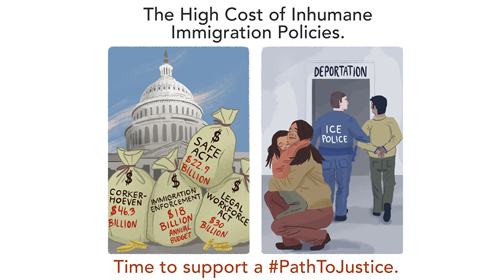
Congress took an important step this week by passing an omnibus appropriations bill— one giant package to replace 12 spending bills that Congress passes in a normal year to keep the government running for the rest of FY 2014 and avoid another government shutdown. Immigration-related provisions are scattered throughout—some good, some bad, and some downright ugly. Here are just a few:
Overall, the deal contains many predictable continuations of the status quo— Americans will continue to spend about $18 billion per year on immigration enforcement—more than we spend on all other principal federal law enforcement agencies combined. This includes funding to Immigration and Customs Enforcement (ICE) to maintain an arbitrary number of immigration detention beds—34,000—at a cost of over $168 million more than the administration requested. We already spend about $2 billion annually on immigration detention, even though readily available, effective alternatives to detention could save taxpayers millions.
The bill also funds E-Verify, the employment verification program that seriously threatens privacy and security and could create obstacles to employment for all Americans, at $114 million. 287(g), a deeply flawed program which causes racial profiling and civil rights abuses, is also funded to the tune of $24.3 million. While this is a welcome reduction from years past, the omnibus also sets an unnecessary $5.4 million spending floor for 287(g), requiring the Department of Homeland Security (DHS) to waste taxpayer dollars on this problematic, unnecessary program regardless of actual demand.
But there are some bright spots: new language that will help to protect pregnant women from shackling in ICE detention facilities—a major step forward in improving detention conditions for some of the most vulnerable detainees.
There is a glimmer of good news at the border also. Although the bill unfortunately maintains an unnecessary minimum of 21,370 Border Patrol Agents—an excessive number, as demonstrated by the near-record low apprehension and migration rates of recent years—it doesn't add new agents, a welcome change after a sharp upward trajectory over the past decade. The measure also includes funding to add 2,000 new Customs and Border Protection (CBP) Officers to staff congested Ports of Entry, speeding the flow of commerce and travel, and improve economic opportunity and quality of life in border communities.
But more is needed to combat the effects of border militarization—in particular, stronger oversight within DHS. Years of inadequate funding for the DHS Office of Civil Rights and Civil Liberties and the Office of Inspector General have created an accountability vacuum at DHS, which consistently fails to investigate and respond to complaints appropriately. Though the omnibus provides both with more funding than a House-passed appropriations bill would have, it still fails to provide adequate resources to properly oversee the massive enforcement machine operated by CBP and ICE.
With work on the omnibus wrapped up, Congress is already beginning to tackle next year's budget that will begin in October. We will be calling for improvements to increase transparency and accountability, improve life in border communities, combat the harsh enforcement regime, and end unjust detention policies.
If you are concerned about how the government is spending your money when it comes to immigration, now is the time to contact your Members of Congress and let them know.
Learn more about immigration enforcement and other civil liberty issues: Sign up for breaking news alerts, follow us on Twitter, and like us on Facebook.

